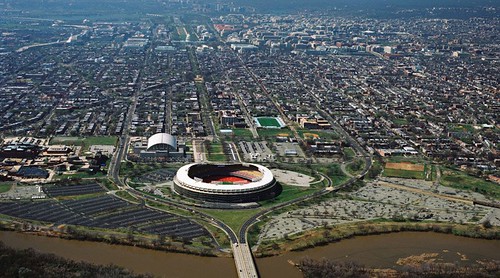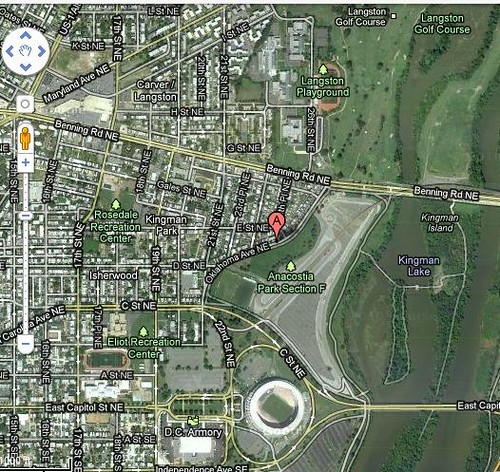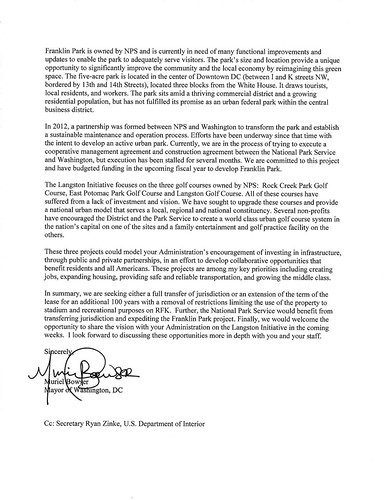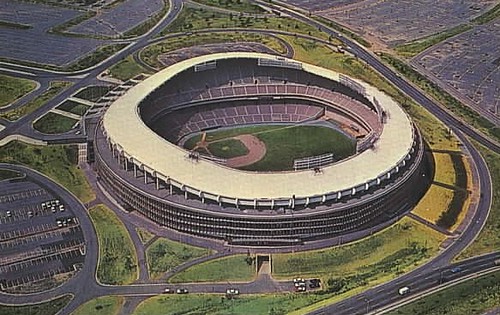Yes, modify and extend the RFK Campus lease; No, don't do it for the Washington Redskins football team
Redskins talking up a new stadium -- in either DC or Maryland. This past week has media reports that team owner Daniel Snyder is looking to play off DC ("Redskins, DC working with Congress to slip stadium provision into spending bill," Washington Post) and Maryland ("Hogan's plan for new Redskins stadium on parkland in Maryland faces hurdles, opposition," Baltimore Sun) against each other for the best deal for a stadium.
WRT DC, it involves getting the Republican-controlled House of Representatives to extend the property lease for the RFK stadium site--where the team played until they moved to Prince George's County Maryland in 1997-- and modify the terms.

Interestingly, Maryland is also looking to get federal land for their proposal, in this case 300 acres adjacent to the National Harbor development in Prince George's County, which is also home to the MGM Casino and a outlet shopping center. But not high frequency rail-based transit.
The proposed DC deal includes three elements:
1. Extending the RFK campus lease of land owned by the National Park Service. Currently the lease expires in 2038.
2. Modifying the lease to allow uses other than recreational. This would allow for mixed use development on the site.
3. Making a new football stadium the centerpiece of the redevelopment.
Over the past couple years, Events DC has created a new master plan for the RFK Campus. But it is encumbered by two facts. First, the lease ends in 20 years and while that seems like a long time, from the standpoint of capital improvements planning it's short, and makes it impossible to finance. Second, it restricts uses on the campus to recreation (a sports stadium has been deemed a compliant use).
I happen to think the lease should be both extended and modified.
It's because the parking lots, especially along Benning Road, ought to be redeveloped, ideally as more housing, in a city that needs it given the ongoing growth of the metropolitan area, and the fact that west of this area, along the H Street corridor, a few thousand housing units have already been added, and more housing will support this commercial district and the city as a whole.

The Washington Post says the same in an editorial. Although they term it more around "Home Rule" and argue that the stadium element is a distraction, that the other changes should go through. The problem is that if Congress does change and extend the lease but also includes a requirement for a stadium, it will require another act of law to change that element in the future.
Recommendations
1. DC should aim to extend the RFK campus lease.
2. DC should aim to modify the RFK campus lease.
3. DC should not get an extension or modification of the lease AT THIS TIME, if it includes a requirement for a football stadium. Let the stadium stay in Maryland or go to Virginia because football teams have limited economic return for local governments.
4. DC should announce that it will embark on a new planning process for the RFK site if the changes come through.
It should have a focus on shrinking the recreation focus somewhat, at least in the Benning Road corridor, and adding multiunit housing, which is a priority.
5. MAKE AS AN UN-NEGOTIABLE CONDITION OF AN AGREEMENT WITH THE REDSKINS THAT THE CURRENT OWNERSHIP SELLS THE TEAM TO NEW OPERATORS. This applies to any jurisdiction.
A new planning initiative should be required. However, were the lease to be modified, I'd argue there needs to be another planning initiative, and it should include the city planning office, whereas the most recent effort was done by Events DC on its own, and only looked at recreational elements, even if from a more expansive definition. From the Post:
City officials have long had their eyes on redeveloping the stadium site, as well as an adjacent 67-acre tract of former federal land to the south. Bowser asked Trump in a March 2017 letter for “either a full transfer of jurisdiction or an extension of the term of the lease for an additional 100 years with a removal of restriction limiting the use of the property.” The letter was also sent to Zinke.
“We believe the site can be transformed to create and preserve green space, add much needed housing and retail, include a sports and/or entertainment purpose and above all generate jobs for our residents and the region,” she wrote.


But if the lease agreement between the National Park Service and the DC Government is modified to remove the restriction on non-recreational development, then the city should commit to and execute a new planning process.
Football isn't substantive economic development tool for the typical city. It'd be great to modify the lease to include mixed use development, especially housing. But tying that to a football stadium is a mistake.

From an economic development standpoint, football stadiums have the least amount of use and the least amount of spillover economic development benefits of any type of major (baseball, basketball, hockey, football) professional sports team.
From the Stanford University press release, "Sports stadiums do not generate significant local economic growth, Stanford expert says":
“NFL stadiums do not generate significant local economic growth, and the incremental tax revenue is not sufficient to cover any significant financial contribution by the city,” said [Roger] Noll, a senior fellow at the Stanford Institute for Economic Policy Research. He has written articles and books and given talks on the public financing of sports stadiums. ...For example, with the Redskins team stadium in Prince George's County, there is little ancillary development in the area that and the county's income from the stadium is negligible outside of an admissions tax.
Noll said that because football stadiums are used so infrequently – two preseason games, eight regular season games and possibly a couple of playoff games – they do not realize a large economic benefit from those games alone. Realizing this, the San Francisco 49ers’ new Levi’s Stadium, which opened last year, has played host to several other events, including concerts and college football, soccer and hockey games.
“By comparison, other billion dollar facilities – like a major shopping center or large manufacturing plant – will employ many more people and generate substantially more revenue and taxes,” Noll said.
Even football stadiums sited in cities as opposed to less dense suburbs tend to anchor desolate areas, although the new stadium in Atlanta has utilized a different development paradigm and maybe eventually it will spark ongoing improvement although it hasn't as of yet ("Building a stadium, Rebuilding a neighborhood," New York Times).
DC doesn't benefit from income taxes on players. One thing that does provide some revenue to states is an income tax on player incomes. This is even extended to the players of visiting teams, on the theory that they are paid based on when and where they play. But DC is forbidden from assessing income taxes on nonresidents, including professional athletes. So that makes the economic return from funding a sports stadium or arena even smaller.
 A project team led by developers Wilson Meany and Stockbridge has unveiled the latest batch of renderings for a 2,500-unit mixed-use neighborhood set to rise around the forthcoming Los Angeles Rams Stadium.
A project team led by developers Wilson Meany and Stockbridge has unveiled the latest batch of renderings for a 2,500-unit mixed-use neighborhood set to rise around the forthcoming Los Angeles Rams Stadium.Ancillary development as a complementary element of sports team stadium/arena projects. Separately, the Rams Stadium in Inglewood in Greater Los Angeles is going to be surrounded by other mixed use development and the NFL is expecting it to be a big money maker.
-- LASED - LA Stadium & Entertainment District at Hollywood Park
-- "Inside Inglewood stadium's massive model," Los Angeles Times
Increasingly, packaging ancillary development with arena-stadium development is now becoming primary because of the high cost of teams--over $2 billion and stadiums and arenas--$600+ million for an arena and more than $1 Billion for stadiums ("How the Warriors are laying the foundation," San Francisco Business Times).
But it isn't incumbent on a locality to provide free/discounted land to a team owner to make team ownership finances work.
In strong market cities, the kind of mixed use development being touted as only possible in association with a sports venture can be created independently.
Note though that others disagree, with the Staples Center example in Los Angeles ("Its design has been scorned, but L.A. Live has been crucial to downtown's resurgence," Los Angeles Times) and with two different projects in DC, originally the now Capital One Arena in Downtown DC's East End and the Washington Nationals baseball stadium in the Capitol Riverfront district in Southeast--proponents claim that these projects spurred development when market and other conditions did not favor it, and there is credence to these claims.
It's true that at the time that the Washington Wizards moved to DC from the suburbs and when the city landed a baseball team that the city was in a much earlier stage in revitalization and these were important votes of confidence that helped to drive further development.
Although like DC 15 and 20 years ago, maybe in Inglewood you do need a stadium to spark the change in economic conditions for that particular area, vis a vis its place in the development landscape of Greater Los Angeles ("The Rams' Inglewood Stadium Could Be a Game Changer in Planning," Architect Magazine; "Renderings unveiled for mixed-use neighborhood around L.A.’s new NFL stadium," Architect's Newspaper).
Choosing your partners carefully. In the context of "public-private partnerships," which are really contracts between governments and the private sector where everything is specified and the private entity not willing to provide anything outside of the contract, I argue that local governments need to be much more careful in choosing their associations.
-- "Trump seeks local tax subsidy for conversion of the Old Post Office into a hotel," 2013
-- "Public entities ought to be more careful of whom they do business with," 2016
-- "Government contracting and being "careful" about your associations," 2017
-- "Been to Largo lately? Sports teams often aren't very good partners," 2018
For example, the Trump Organization, which regularly sues governments to reduce property taxes and stiffs contractors ought not to be a preferred firm. Or the Miami Marlins baseball team, which is trying to get out of a requirement to pay a small portion of the profit on the sale of the team to Miami-Dade County in recognition of its investment in the stadium.
The Daniel Snyder owned Washington Redskins is a lousy operator and partner. While I am not a fan of team sports, I follow sports from the standpoint of politics, business, and society, especially because so often local, regional, and state governments provide public, financing for stadiums and arenas.
This year's recent disintegration of the team's success is merely one example in the almost two decades of failure while Snyder has owned the team. They are one of the worst performers in the National Football League. Why would you want them to be your partner? Why would you give into their demand for many hundreds of millions of dollars for a stadium when the likelihood is that they will continue to be a bad actor and the team will suck.
Tom Boswell, a sports columnist for the Post, makes the same argument ("So you want to give Dan Snyder land for a new stadium? Don’t say you weren’t warned"). From the article:
I don’t care if or where Snyder builds a new stadium. I just hope everyone in the DMV understands that the shabby way Snyder deals with his own customers — and the way he is playing politicians against each other while keeping some of them in the dark — is exactly the behavior they can expect if he moves to their turf. The bigger the project — and this ego-driven monstrosity no doubt would be vast — the worse it can turn out. For your wallet or your quality of life. ...The San Francisco Chronicle produced an in-depth series on the Golden State Warriors basketball team upon their move to San Francisco to Oakland. I didn't realize that the team hadn't been that high-performing, but things changed under new ownership. From "Building a dynasty: Warriors implement their blueprint for success":
Of course, the value of the land that would be under a stadium at RFK would be far more valuable than the PG parcel. Snyder would not own the land on either site, but the value of his franchise would be enhanced if it were built on top of pricier D.C. land. Location, location . . .
Snyder, perhaps, has picked an unfortunate time to be finagling with multiple jurisdictions about a stadium of which the public has heard little or nothing. The Redskins’ popularity, once invulnerable, has plummeted under Snyder, who has removed thousands of seats at FedEx Field because he can’t sell them. He also listens as his team is booed, for example this past Sunday, trailing 40-0, or else hears his own fans drowned out by the cheers of fans of the visiting team.
... championships are built [...] with aggressive ownership, clever planning, a measure of good luck and a policy of inclusion when it comes to big decisions.The Redskins are unlucky, at least under current ownership, and the ownership is aggressive in all the wrong ways, not aggressive from the standpoint of bold leadership and vision and most importantly, the ability to execute.
That's why I say a jurisdiction should say, when (and they always do) agree to the onerous terms of a stadium deal for the Redskins, that it is conditional on Snyder selling the team.
Labels: commercial district revitalization planning, sports and economic development, urban design/placemaking, urban revitalization



3 Comments:
interesting point in a lawsuit initiated by residents of Fulton County, GA, that stadiums typically owned by public authorities don't pay taxes, even though the stadiums are usually run by the team.
https://www.ajc.com/news/local-govt--politics/group-claims-mercedes-benz-stadium-should-paying-property-taxes/FgHL3su1jUgnXOk9Lf8XeJ/
The local tax board disagrees, arguing that the team doesn't have a lease, but a "license" to use the stadium, and under Georgia law such licenses don't trigger property tax obligations.
1/23/2019
Speaking of Snyder and the Washington Football Team being lousy partners.
The team is poorly maintaining FedEx Stadium
https://sports.yahoo.com/jalen-hurts-wants-answers-from-wft-nfl-over-near-tragic-railing-collapse-at-fed-ex-field-223802769.html
and this is likely going to mean that DC proper won't be a host for World Cup soccer games in 2026
https://www.washingtonpost.com/sports/2022/01/19/washington-dc-world-cup-bid-fedex-field/
"Concerns about FedEx Field complicate Washington’s 2026 World Cup bid"
Washington might have to consolidate its 2026 World Cup venue bid with Baltimore because of concerns about the viability of playing at FedEx Field, a major blow to the city’s efforts of hosting soccer’s marquee event, people familiar with the matter said Wednesday.
As part of a joint regional effort, Baltimore’s M&T Bank Stadium would become the area’s game venue and the District would stage nongame events, such as large-scale watch parties on the National Mall, said two people, who spoke on the condition of anonymity to openly discuss the situation.
In the fall, Washington received high marks for its presentation to FIFA, the sport’s global governing body, but FedEx Field, a Landover venue plagued with problems for years, did not, those people said.
The Washington football team is again lobbying Congress about this land.
As stadium competition looms, Commanders lobby Congress over future of RFK
https://www.washingtonpost.com/sports/2023/05/04/commanders-lobbying-rfk-bowser-mendelson/
Post a Comment
<< Home